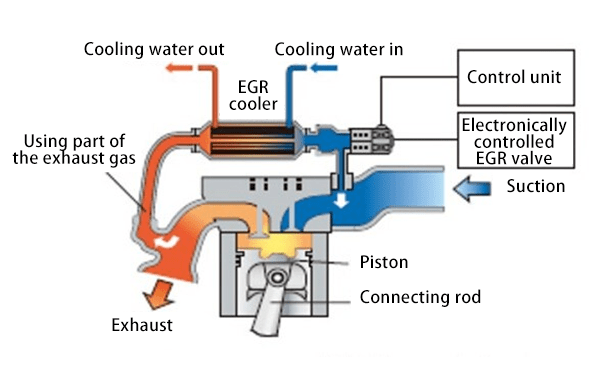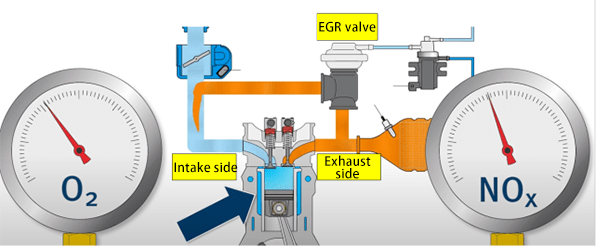
The EGR (Exhaust Gas Recirculation) valve plays a crucial role in modern engine management systems, helping to reduce harmful emissions and improve fuel efficiency. Over time, however, EGR valves can wear out or become clogged, leading to decreased performance and increased emissions. When this happens, replacing the EGR valve becomes necessary.
In this article, we'll delve into the various factors that influence EGR valve replacement cost, provide estimates, and discuss important considerations for vehicle owners.
1. What is an EGR Valve?
Before diving into the cost considerations, let's briefly review the function of the EGR valve.
The EGR valve is responsible for recirculating a portion of the exhaust gases back into the engine's intake manifold. By reintroducing exhaust gases into the combustion chamber, the EGR valve helps lower combustion temperatures and reduce the formation of harmful nitrogen oxides (NOx). This process ultimately helps vehicles meet emissions regulations while also improving fuel economy.

2. Factors Influencing EGR Valve Replacement Cost
Several factors contribute to the overall cost of replacing an EGR valve. Understanding these factors can help vehicle owners anticipate expenses and make informed decisions. Here are some key considerations:
Vehicle Make and Model: The make and model of the vehicle significantly impact the cost of EGR valve replacement. Luxury or imported vehicles may have higher parts and labor costs compared to economy models.
Type of EGR Valve: EGR valves come in various designs, including electronic and mechanical types. Electronic EGR valves tend to be more expensive to replace due to their intricate components and electronic control systems.
OEM vs. Aftermarket Parts: Vehicle owners have the option to choose between OEM (Original Equipment Manufacturer) and aftermarket EGR valves. OEM parts are designed specifically for the vehicle's make and model, but they often come with a higher price tag. Aftermarket parts may offer a more affordable alternative, but quality can vary.
Labor Costs: Labor charges for EGR valve replacement can vary depending on the mechanic's hourly rate and the complexity of the job. Factors such as accessibility of the EGR valve and the need for additional repairs or maintenance can also influence labor costs.
Additional Components: In some cases, replacing the EGR valve may require replacing other components such as gaskets, hoses, or sensors. Factoring in the cost of these additional parts is essential for an accurate estimate.

3. Estimated Cost Range of EGR Valve Replacement
While it's challenging to provide an exact cost for EGR valve replacement due to the variability mentioned above, we can offer a general estimate based on industry averages and historical data. Keep in mind that these figures are for informational purposes only and actual costs may vary.
On average, EGR valve replacement costs can range from $150 to $500, including parts and labor. However, it's crucial to obtain a personalized quote from a reputable mechanic or automotive service center to account for specific vehicle requirements and local market conditions.
3.1 Cost Breakdown of EGR Valve Replacement
To better understand the components of EGR valve replacement cost, let's break down the expenses:
Parts: The cost of the EGR valve itself can range from $50 to $300, depending on the type (electronic or mechanical) and whether it's an OEM or aftermarket part. Additional components such as gaskets, hoses, or sensors may add to the parts cost.
Labor: Labor charges typically account for a significant portion of the overall cost. Mechanics may charge hourly rates ranging from $80 to $150 per hour, and the time required for EGR valve replacement can vary depending on the vehicle's make and model, accessibility of the valve, and any additional complications.
Diagnostic Fees: Some mechanics may charge a diagnostic fee to assess the vehicle's EGR system and pinpoint the issue before proceeding with replacement. Diagnostic fees typically range from $50 to $150 but may be waived if the vehicle owner chooses to proceed with the repair.

4. Considerations for Vehicle Owners
When faced with the need for EGR valve replacement, vehicle owners should consider the following factors to make informed decisions:
Quality of Parts: While aftermarket parts may offer cost savings, it's essential to prioritize quality and reliability. Opting for OEM parts or reputable aftermarket brands can help ensure proper fitment and performance.
Warranty Coverage: Be sure to inquire about warranty coverage for both parts and labor when replacing the EGR valve. OEM parts may come with a manufacturer warranty, while some mechanics offer warranties on their labor services.
Maintenance History: Regular maintenance, including cleaning or servicing the EGR system, can help prolong the lifespan of the EGR valve and prevent premature failure. Vehicle owners should adhere to recommended maintenance schedules to avoid costly repairs.
Shop Reputation: When selecting a mechanic or automotive service center for EGR valve replacement, consider factors such as reputation, experience, and customer reviews. Choosing a reputable professional ensures quality workmanship and peace of mind.
Cost-Benefit Analysis: Evaluate the cost of EGR valve replacement against the potential benefits, including improved engine performance, fuel efficiency, and emissions compliance. In some cases, investing in EGR valve replacement may be more cost-effective in the long run.
5. FAQs about EGR Valves
5.1 What Are the Types of Exhaust Gas Recirculation?
Exhaust gas recirculation (EGR) systems typically fall into two main types: external EGR and internal EGR.
1. External EGR: In this system, exhaust gases are redirected from the exhaust manifold or downstream of the catalytic converter back into the intake manifold before entering the combustion chamber.
2. Internal EGR: Internal EGR involves recirculating exhaust gases within the combustion chamber itself by leaving a portion of exhaust gases in the cylinder during the exhaust stroke, then mixing them with fresh air during the intake stroke.
Both systems aim to reduce nitrogen oxide emissions by lowering combustion temperatures.
5.2 What Does EGR Valve Do on a Car?
The EGR valve on a car is responsible for recirculating a portion of exhaust gases back into the engine's intake manifold. This process helps reduce nitrogen oxide emissions by diluting the incoming air-fuel mixture with inert exhaust gases.
By reintroducing exhaust gases into the combustion chamber, the EGR valve lowers the combustion temperature, which in turn reduces the formation of nitrogen oxides (NOx). This is particularly important for meeting emissions standards and improving fuel efficiency, as it allows engines to operate more efficiently under various driving conditions.

5.3 Can You Drive on a Bad EGR Valve?
Yes, you can technically drive with a bad EGR valve, but it's not recommended for several reasons. A malfunctioning EGR valve can lead to decreased fuel efficiency, increased emissions, engine knocking, and even potential engine damage over time. It's best to address EGR valve issues promptly to ensure optimal engine performance, emissions compliance, and overall vehicle health.

5.4 How Much Does an EGR Valve Cost?
The cost of an EGR valve varies depending on the make and model of your vehicle, as well as whether you choose an OEM (Original Equipment Manufacturer) or aftermarket part.
On average, an EGR valve can range from $100 to $500, including parts and labor if you have it installed by a mechanic. However, prices may fluctuate based on market conditions, location, and specific vehicle requirements. It's advisable to consult with a trusted mechanic or parts supplier for the most accurate pricing information.
6. Conclusion
EGR valve replacement is a necessary maintenance task for vehicles equipped with exhaust gas recirculation systems. While the cost of replacement can vary based on several factors, including vehicle make and model, type of EGR valve, and labor charges, vehicle owners can expect to pay an average of $150 to $500 for parts and labor.
Understanding the factors influencing EGR valve replacement cost and considering important factors such as part quality, warranty coverage, and maintenance history can help vehicle owners make informed decisions and ensure optimal performance and emissions compliance for their vehicles. Consulting with a trusted mechanic or automotive service center is recommended for personalized estimates and professional assistance with EGR valve replacement.


